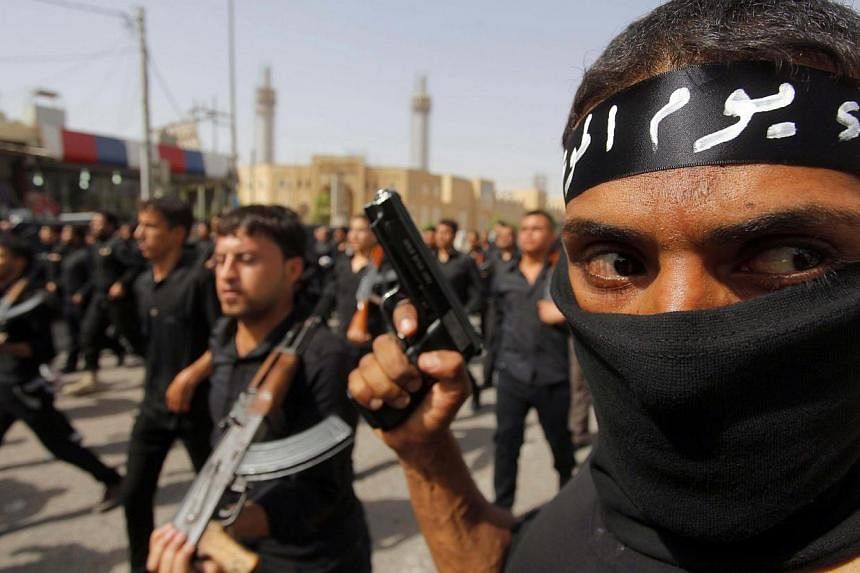BAGHDAD (AFP) - Powerful Shi'ite cleric Moqtada al-Sadr vowed on Wednesday to "shake the ground" under the feet of advancing Sunni militants as Iraqi premier Nuri al-Maliki warned rivals against exploiting the crisis to sideline him.
Mr Sadr, whose movement long battled US forces during Washington's nearly nine-year war in Iraq, also voiced opposition to American military advisers meeting with Iraqi commanders combatting an offensive that has overrun swathes of five provinces, killed nearly 1,100 people, displaced hundreds of thousands and threatens to tear the country apart.
His remarks came as security forces continued to repel assaults on critical towns and infrastructure, though fighters from Al-Qaeda's Syrian franchise made a local alliance with the jihadist group leading the charge in Iraq, bolstering its offensive.
"We will shake the ground under the feet of ignorance and extremism," Mr Sadr said in a televised speech from the Shi'ite holy city of Najaf.
He added that he only supported "providing international support from non-occupying states for the army of Iraq".
The cleric's remarks came days after fighters loyal to him paraded with weapons in the Sadr City area of north Baghdad, vowing to fight a major militant offensive that has alarmed the world and threatens to tear Iraq apart.
Iraq's flagging security forces were swept aside by the initial offensive but have since at least somewhat recovered, and while Mr Sadr's Mahdi Army militia remains officially inactive, fighters loyal to the cleric have nevertheless vowed to combat the militant advance.
The cleric also called for "new faces" in a national unity government following April 30 elections that saw incumbent prime minister Maliki emerge with by far the most seats, albeit short of a majority.
In apparent response to calls from Sunni tribal leaders to form a government that ignores the result of an April 30 election, which they describe as a sham, Mr Maliki said on Wednesday that would be a "coup against the constitution and the political process".
The beleaguered premier, whose bloc won by far the most seats in April, said such a move was "an attempt by those who are against the constitution to eliminate the young democratic process and steal the votes of the voters."
Though Washington has pressed for Iraq's fractious political leaders to unite in the face of the campaign led by the Islamic State of Iraq and the Levant (ISIS) jihadist group, they have shown little sign of coming together.
US "support will be intense, sustained, and if Iraq's leaders take the necessary steps to bring the country together, it will be effective," Secretary of State John Kerry said during a visit to Iraq in which he met numerous politicians and urged them to work together.
US President Barack Obama has so far refrained from carrying out air strikes on the insurgents, as urged by Mr Maliki, but American military advisers began meeting Iraqi commanders Wednesday, with Washington having offered up to 300.
Washington has stopped short of calling for Mr Maliki to go, but has left little doubt it feels he has squandered the opportunity to rebuild Iraq since American troops withdrew in 2011.
In a sign the Iraqi military has performed better in recent days, loyalists fought off insurgent attacks Wednesday on a major air base and a key western town, after repelling assaults on Iraq's biggest oil refinery.
Militants and security forces clashed periodically overnight, but government troops maintained control of the Balad air base, while another offensive was repelled in Haditha in Anbar province, west of Baghdad.
But the country was nevertheless hit by militant violence, with bombings and shelling south of Baghdad and in the disputed, ethnically mixed northern oil hub of Kirkuk killing 20 people.
Maliki's security spokesman has meanwhile said hundreds of soldiers have been killed since the offensive began.
Insurgents were also bolstered by fighters when Al-Nusra Front, Al-Qaeda's front group in Syria, made a local pledge of loyalty to ISIS on a town along the Syria-Iraq border, giving it control over both sides of the frontier.
The move reflects how ISIS is fast gaining the upper hand in eastern Syria, where it has been locked in combat with fighters from the Al-Qaeda franchise and its allies virtually all year.
ISIS adheres to a harsh interpretation of Islamic law and considers Iraq's majority Shi'ite population to be heretics.
It aims to create an Islamic state straddling Iraq and Syria, where it has become a major force in the rebellion against President Bashar al-Assad.
It has commandeered an enormous quantity of cash and resources during the advance, boosting its coffers.
The United Nations says at least 1,075 people have been killed in Iraq between June 5 and 22 and has triplied its appeal for aid funding to more than $312 million (S$389.9 million), while the UN food agency has warned that the country faces "serious food security concerns".

